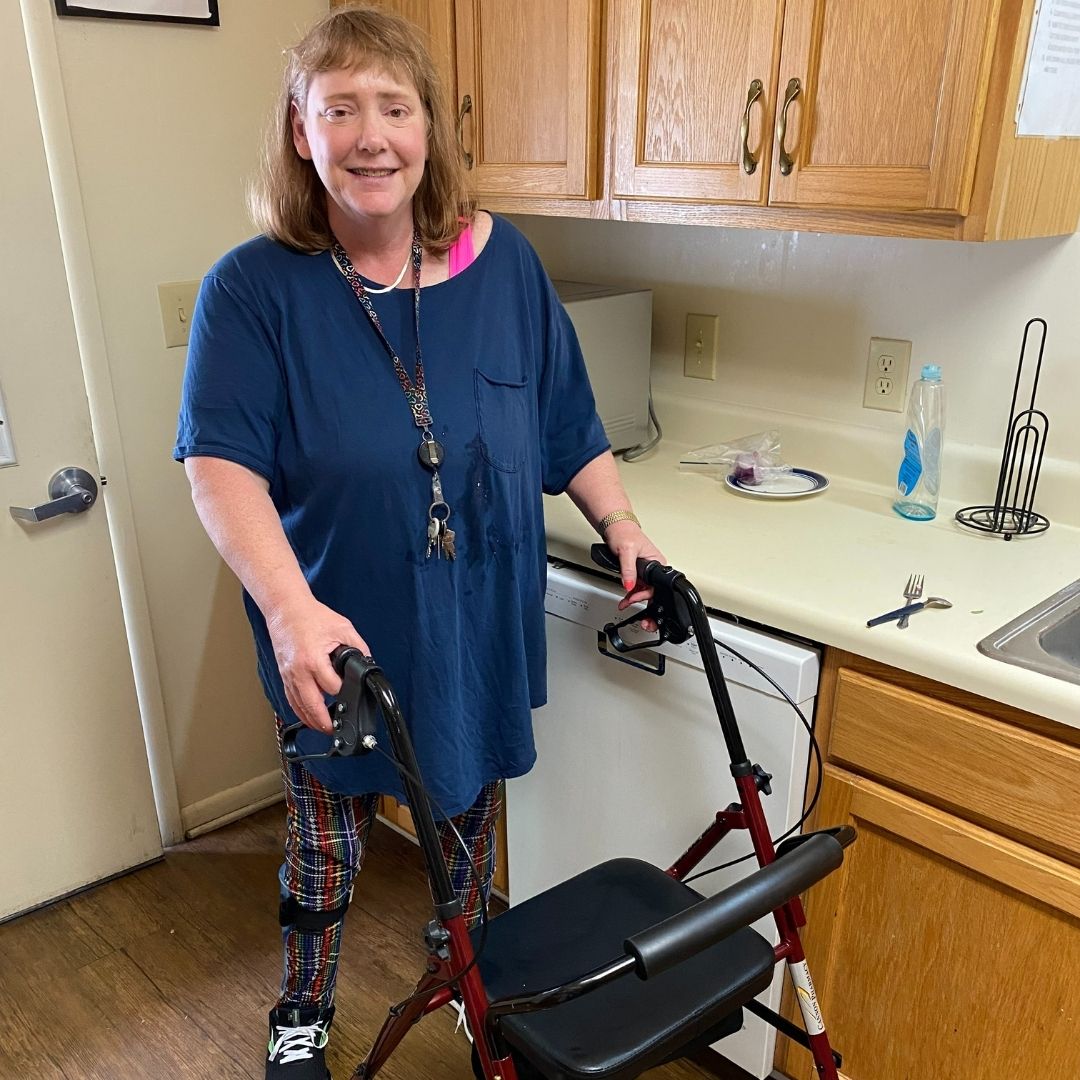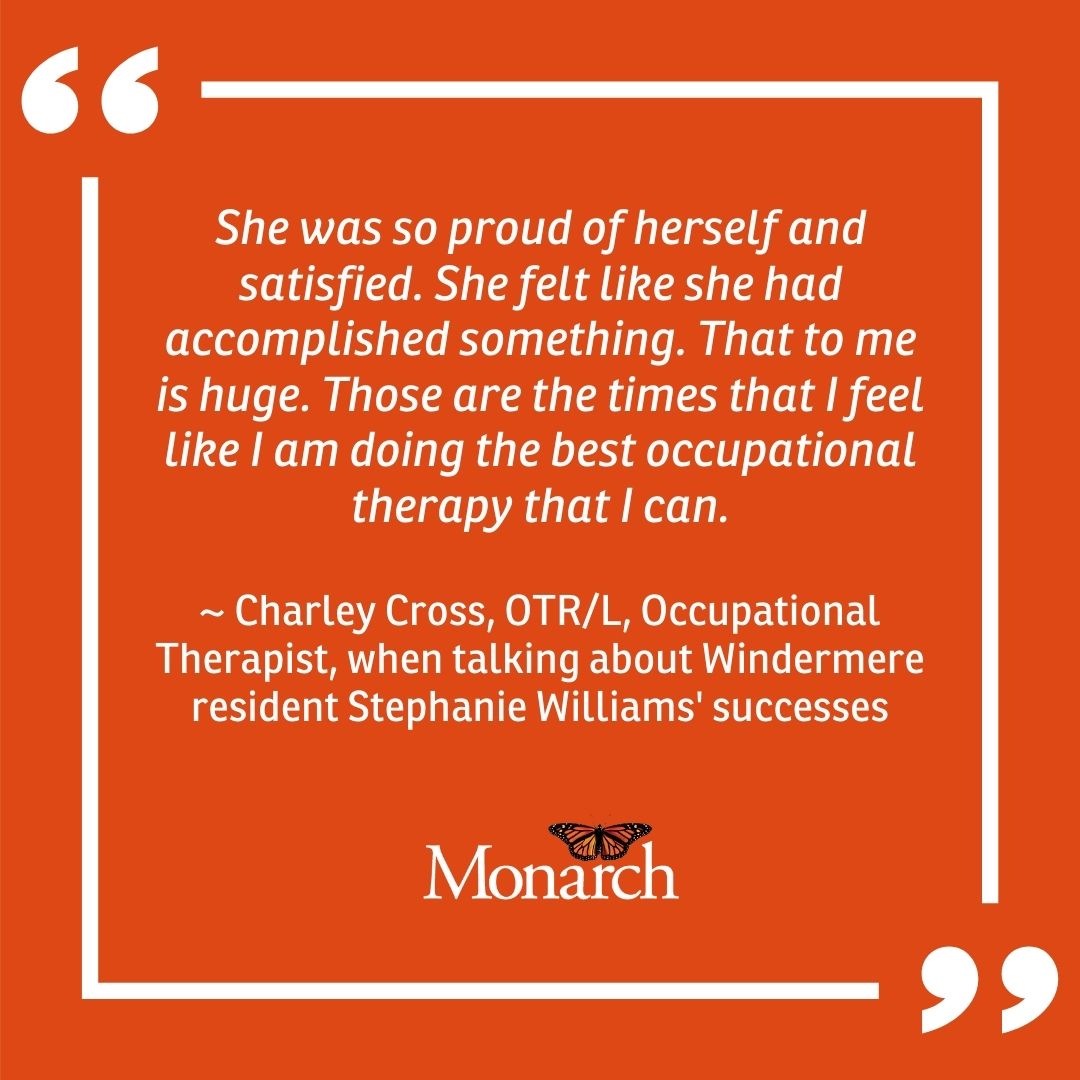Windermere Resident Reaches Goals with Occupational Therapy

Stephanie Williams, a resident of Monarch’s Windermere group home in Cabarrus County, uses her rolling walker safely thanks to occupational therapy assistance.
Stephanie Williams, a resident of Monarch’s Windermere group home in Cabarrus County, has a personal goal to live as independently as she possibly can. Her family realized she needed a helping hand in achieving this goal.
In addition to the everyday assistance of the Windermere group home staff, Monarch Occupational Therapist (OT) Charley Cross, OTR/L, took a look at ways in which Williams could achieve her goals and began a seven-week series of personalized OT sessions last May.
Cross reviewed Williams’ group home surroundings, the way she interacted with fellow residents and staff and how she was mobile in the group home with the assistance of a rolling walker.
Cross admits most people are aware of the benefits of physical therapy but often misunderstand what OT can accomplish. “OT is more a process and a way of thinking than specific interventions. It can look different in every setting. It can be about addressing self-care basics or home management tasks in a skilled care facility, or how to use scissors in a school setting,” she explained.
While occupational therapy services are traditionally thought of in relation to recovery from injury or illness, they can also play an important role in the treatment of mental illness and substance use disorders as patients work to care for themselves such as in long-term services and support settings. In mid-2020, Monarch began integrating OT into behavioral health treatments through its Certified Community Behavioral Health Center (CCBHC) in Stanly County.
Cross said she looks forward to assisting the individuals served through long-term services and supports and enjoys analyzing where they are at and how OT can be incorporated to reach their goals.
Cross helped Williams improve mobility and cognitive issues. This included showing Williams safe ways to navigate surroundings with her rolling walker. Another component of their OT sessions included how to follow cooking directions and assemble a meal in the group home’s kitchen. Cross helped Williams in this area by breaking down a recipe or prepared meal directions into simpler, manageable steps.
By the end of the duo’s OT sessions, Williams was proud to be able to prepare meals with up to 10 steps and participate in the weekly task of cooking dinner for her fellow residents. The pair also worked on devising a grocery list, becoming more assertive and utilizing a calendar to keep on task.
 “Spaghetti is my favorite meal to make. My meals aren’t always good but I try,” Williams said with a smile, noting that Thursday is her night to cook and she is now armed with a notebook of recipes she can follow and share.
“Spaghetti is my favorite meal to make. My meals aren’t always good but I try,” Williams said with a smile, noting that Thursday is her night to cook and she is now armed with a notebook of recipes she can follow and share.
“She was so proud of herself and satisfied. She felt like she had accomplished something. That to me is huge. Those are the times that I feel like I am doing the best occupational therapy that I can,” Cross shared, adding that bringing OT services to the residents of Monarch’s group homes will continue.
“The hope is that whenever starting OT with a person supported, they become more independent and enjoy the benefits of greater independence. When a person feels accomplished and satisfied with their occupational performance, the person’s self-confidence and self-esteem increases and depression decreases,” Cross said.
Williams’ sister and legal guardian, Valarie Haisley, couldn’t be more pleased and expressed the family’s delight. Throughout the OT sessions with Cross, Williams reported to her family the progress she was making.
“When Stephanie called me after she made her first meal using a simplified process, she was elated and joyous with her success. Her self-worth and self-esteem received a much-needed boost,” wrote Haisley of her sister’s improvements.
Williams’ family also thanked Medical Director Dr. Robert McHale, M.D., M.Sc., DFAPA, ABPM, FASAM; Director of Program Operations Nancy Kaierle; Residential Team Leader Omar Polk, B.A., QP; Residential Manager Jasmine Hailey; and the rest of the Windermere group home staff.
Posted on: Wednesday September 29, 2021
